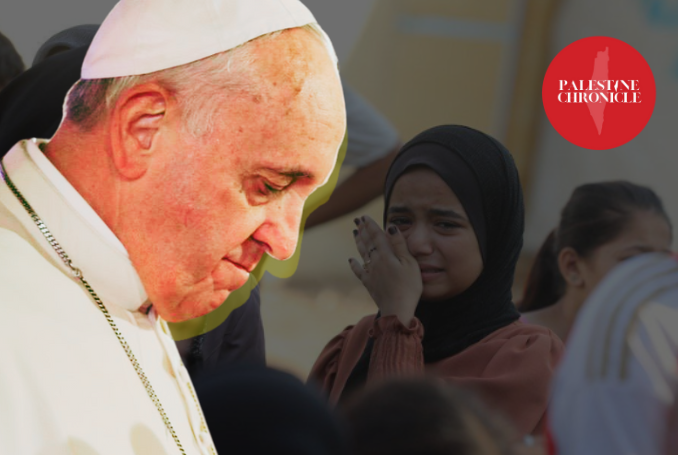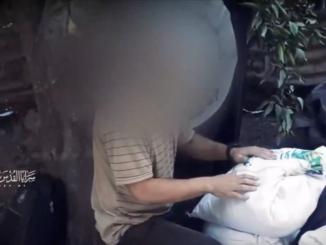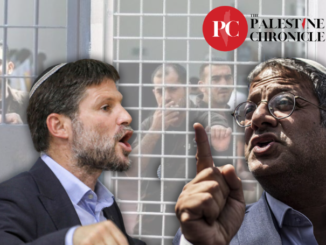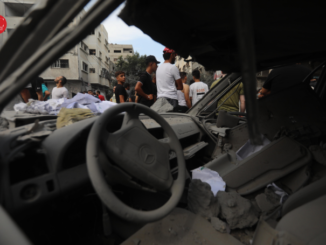
By Romana Rubeo 
Pope Francis, who passed away at 88, leaves behind a legacy defined by his steadfast calls for peace and justice in Gaza, persistently urging ceasefires, condemning violence, and advocating for the protection of civilians.
Pope Francis, who passed away on Monday morning at the age of 88, was the first Jesuit and the first Latin American pontiff.
In the final years of his papacy, he consistently spoke out about the war in Gaza, expressing concern for civilians and calling for peace and humanitarian access.
Since October 9, 2023, Pope Francis has been calling Gaza’s Holy Family Parish every evening—brief conversations at 7 PM, marked by simple, human questions: “How are you?” “What did you eat?”
These nightly calls, as reported by Vatican News, offered a vital sense of connection and comfort to the more than 600 people, both Christians and Muslims, sheltering in the parish’s church and school. He always ended with a blessing, making the sign of the cross and saying, “Muchas gracias, grazie tante.”
But the Pope’s compassion extended beyond personal gestures. From the outset of Israel’s genocidal war on Gaza, he steadily increased his public condemnation.
In January 2025, he called the humanitarian crisis in Gaza “very serious and shameful” and firmly stated: “We cannot in any way accept the bombing of civilians … that children are freezing to death because hospitals have been destroyed.”
Weeks earlier, he had suggested the international community must ask whether Israel’s military campaign amounted to genocide—a remark that drew sharp criticism from Israeli officials, who accused him of antisemitism.
The following timeline highlights the most significant public statements Pope Francis made on Gaza:
‘War is a Defeat’
On October 29, 2023, during his Angelus address, Pope Francis called for a ceasefire in Gaza.
He urged for humanitarian aid to be allowed into Gaza and for all captives to be freed. He emphasized that “War is always a defeat! Every war is a defeat!”
‘Courageous Paths to Peace’
On December 3, 2023, Pope Francis expressed deep sorrow over the resumption of Israeli attacks on Gaza following a temporary ceasefire. He warned that the end of the humanitarian pause brings renewed “death, destruction, misery.”
Speaking after his Sunday Angelus prayer, the pontiff noted that the situation in Gaza continued to deteriorate. “There is so much suffering in Gaza, there is a lack of basic necessities,” he said.
The Pope called for a ceasefire and urged to “find solutions other than arms, trying to take courageous paths to peace.”
‘Please Stop!’
On March 3, 2024, Pope Francis reiterated his call for “an immediate ceasefire in Gaza.”
“I carry daily in my heart, with sorrow, the suffering of the peoples in Palestine and Israel due to the ongoing hostilities,” the pope said, adding:
“Do you really think you are going to build a better world this way? Do you really think you are going to achieve peace? Enough, please! Let us all say: Stop! Please stop!”
“No Peace without Justice”
On April 3, 2024, during his general Wednesday audience, Pope Francis condemned the killing of aid workers in Gaza by Israel and renewed his call for an immediate ceasefire.
Speaking to a crowd of 25,000 in St. Peter’s Square, the pontiff expressed sorrow over the deaths of seven World Central Kitchen volunteers, who were killed by an Israeli strike while delivering food in what had been designated a “deconflicted zone.”
“I express deep regret for the volunteers killed while distributing food aid in Gaza,” he said.
Pope Francis centered his message on the virtue of justice, calling it essential to peace and the foundation of a society governed by law.
“Without justice, there is no peace,” he said. “Indeed, if justice is not respected, conflicts arise. Without justice, the law of the prevalence of the strong over the weak is entrenched.”
‘Ceasefire on All Fronts’
On August 15, 2024, on the Solemnity of the Assumption, Pope Francis decried the grave humanitarian crisis in Gaza.
He appealed for a ceasefire on all fronts and aid to the exhausted population of the Strip. He reiterated that “war is a defeat.”
Investigation into ‘Genocide’
In a book released ahead of the Jubilee Year 2025, Pope Francis called for an investigation into the unfolding genocide in Gaza, urging the world not to look away from the suffering of its people.
“I am thinking above all of those who leave Gaza in the midst of the famine that has struck their Palestinian brothers and sisters given the difficulty of getting food and aid into their territory,” the pontiff wrote.
He went further, raising the alarm on the potential severity of the situation: “According to some experts,” Pope Francis noted, “what is happening in Gaza has the characteristics of a genocide. It should be carefully investigated to determine whether it fits into the technical definition formulated by jurists and international bodies.”
Nativity Scene
On December 8, Pope Francis unveiled the Vatican’s annual nativity scene, which featured baby Jesus draped in a Palestinian keffiyeh, according to Vatican News.
This symbolic addition underscored the Holy Family’s connection to Bethlehem and served as a nod to the Palestinian struggle.
Crafted by Palestinian artists from Bethlehem, the scene included a Bethlehem Star inscribed in both Latin and Arabic with the words: “Glory to God in the highest, and on earth peace, goodwill to all people.”
Figures of the Holy Family were carved from olive wood, further connecting the display to its place of origin.
‘Cruelty, Not War’
On December 21, 2024, Pope Francis criticized the bombing of children in Gaza, describing it as an act of “cruelty.”
His statement followed a report from Gaza’s Civil Defense rescue agency that an Israeli airstrike in the northern part of the territory on Friday killed 10 members of a family, including seven children.
“Yesterday they did not allow the Patriarch (of Jerusalem) into Gaza as promised. Yesterday, children were bombed. This is cruelty, this is not war,” he told members of the Holy See’s government, adding, “I want to say it because it touches my heart.”
‘End to Heavy Bombing’
On March 23, from the window of Rome’s Gemelli hospital, Pope Francis made his first public appearance in five weeks, greeting over 3,000 well-wishers gathered with flowers and “welcome home” signs.
Though still recovering, the Pope used the moment to call for peace, as his Sunday message focused on the ongoing genocidal war on Gaza.
Reflecting on the day’s Gospel, the Pope drew attention to the suffering in Palestine and in conflict zones around the world.
“I am saddened by the resumption of heavy Israeli bombing on the Gaza Strip, causing many deaths and injuries,” he wrote.
Pope Francis warned of the “very serious” humanitarian crisis in Gaza and urged the international community to act swiftly to alleviate the suffering.
Easter Message
Just a few hours before he passed away, on Easter Sunday, Pope Francis delivered his Urbi et Orbi message—“to the city and to the world”—focusing on the Holy Land, which he described as “wounded by conflict” and gripped by an “endless outburst of violence.”
He expressed particular solidarity with the people of Gaza and the Christian community there, where “the terrible conflict continues to cause death and destruction and to create a dramatic and deplorable humanitarian situation.”
“I appeal once again,” he said, “for an immediate ceasefire in the Gaza Strip”.
The Pope urged the international community to take action and “come to the aid of a starving people that aspires to a future of peace.”
(The Palestine Chronicle)

– Romana Rubeo is an Italian writer and the managing editor of The Palestine Chronicle. Her articles appeared in many online newspapers and academic journals. She holds a Master’s Degree in Foreign Languages and Literature and specializes in audio-visual and journalism translation.








The people of Gaza will miss this advocate for a ceasefire and the end to Palestinian deaths. I can only hope and pray that the new Pope will follow his lead and call the faithful to oppose this genocide.
I never subscribed to the “De mortuis nihil nisi bene” principle of not speaking ill of the dead, which pre-empts any honest evaluation of their legacy. I fault the Palestinians for their seemingly hard-wired tendency of trying to find the ‘good’ in everyone even when the evidence to the contrary is blatant. They do that with “anti-zionist zionists” who express “concern” for the enormous Palestinian suffering.
They do so now with this praise for Bergoglio who did NOTHING to aid their cause and arguably caused harm with his “concern” for Palestinian suffering that actually amounted to an insidious attempt to equalize it with the suffering” of the blood-thirsty aggressors. Examples follow
Bergoglio:
““I carry daily in my heart, with sorrow, the suffering of the peoples in Palestine and Israel due to the ongoing hostilities.” [Yeah, you know, it’s “hostilities” and both side suffer…]
or
“Do you really think you are going to build a better world this way? Do you really think you are going to achieve peace? Enough, please! ”
[See, they mean well –peace, a better world–but are just mistaken in how they pursue these noble goals.]